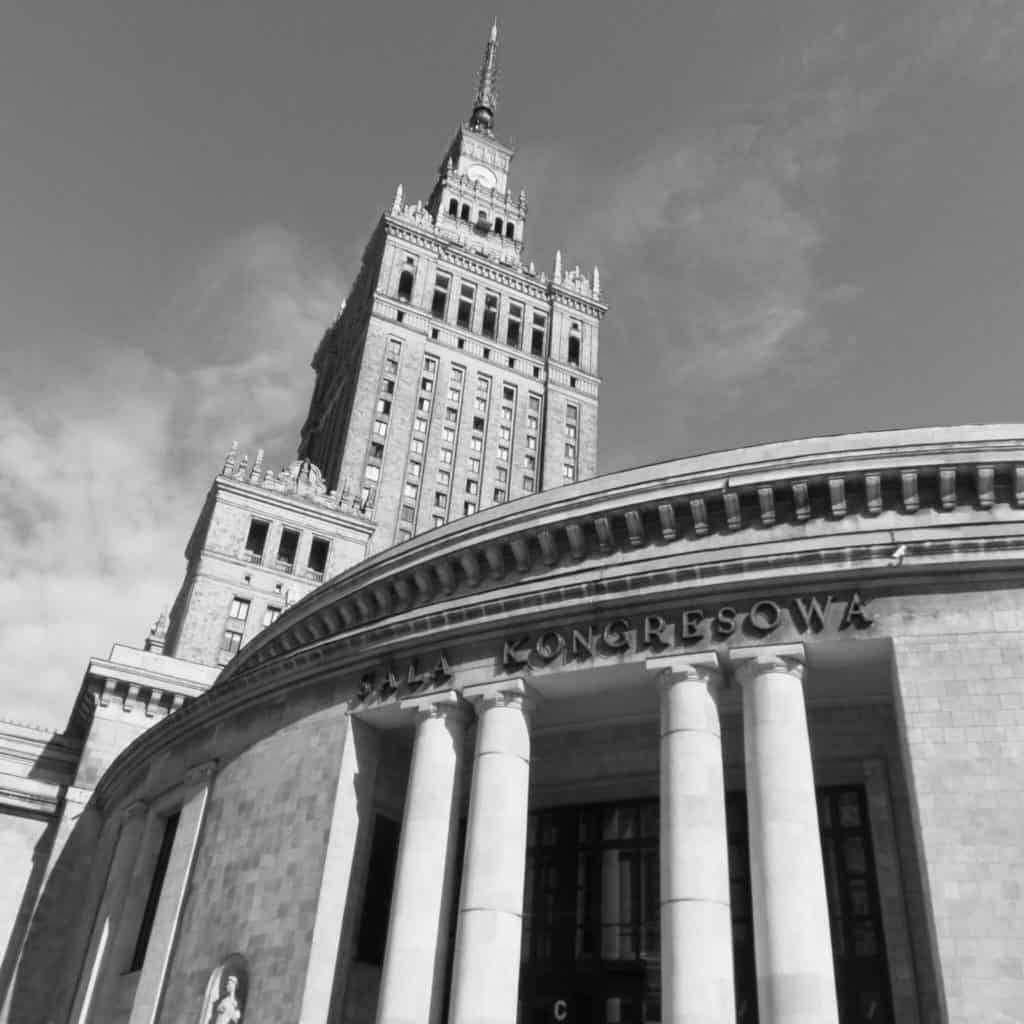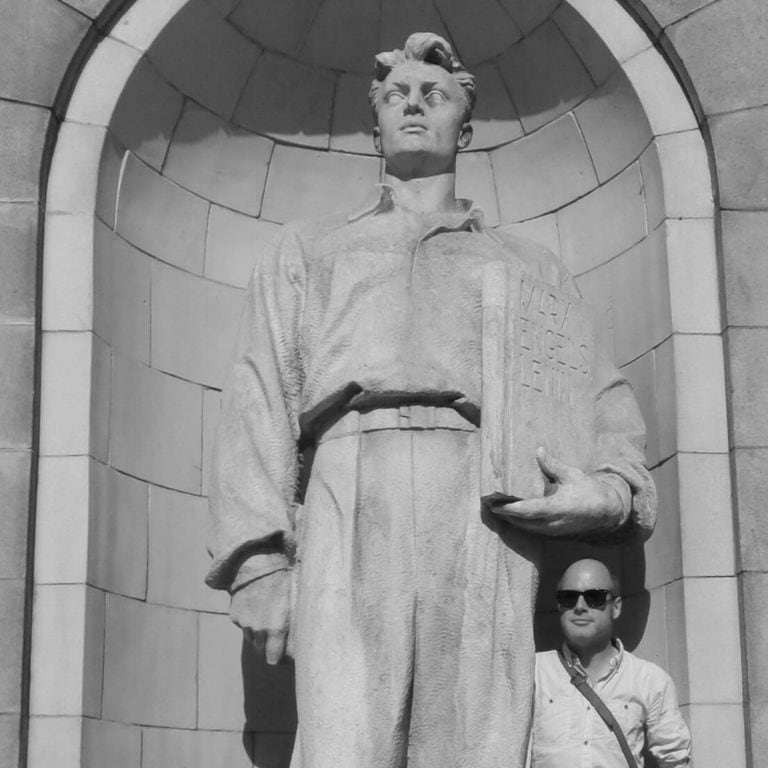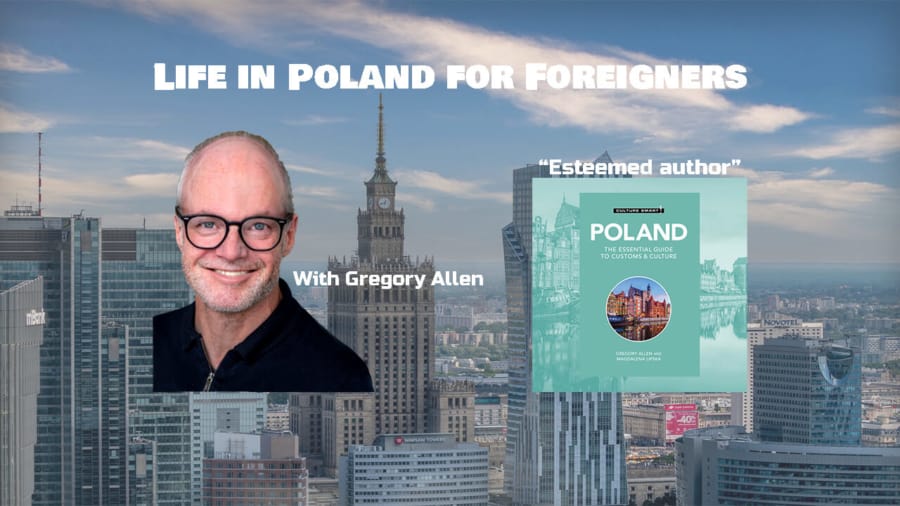Following on from Finding Poland’s review of the book – ‘Poland – Culture Smart!’ – I caught up with co-author, Gregory Allen, for a good old chinwag on the topic of living as an expat in Poland.
If the truth be known, this is more of a retrospective account of what living in Poland is like. After all, Gregory moved to Poland in 1994 and stayed there until 2006. Nevertheless, with his riveting recollections, knowledge of present-day Poland and candid sociological insight popping up at regular intervals, this is one interview you won’t want to miss reading.
A little bit about Gregory Allen
From Winnipeg in Canada, Gregory Allen, Ph.D., is a sociologist and Senior Lecturer in Organizational Behavior at Anglia Ruskin University in Cambridge, England. He specialises in cross-cultural management, workplace diversity, and critical management studies. Gregory wrote his doctoral thesis on the perceptions of expatriate managers based in Poland – a topic on which he has written for both academic and industry-related publications.
1. Before we go into the ins and outs of your take on living as an expat in Poland, can you talk a little bit about your background and perhaps what led you to Poland in the first place?
I first went to Poland in 1994. I’d just finished my undergraduate degree in Winnipeg, Canada. Frankly, I wasn’t sure what to do with my career so I signed up with the Canadian Development Agency which basically sends people to less economically developed countries - as Poland was at the time. This wasn’t on a voluntary basis but it was nevertheless a low-paid job.
So I taught at a regular high school but they had enhanced English language provision. I was teaching Geography in the International Baccalaureate Programme and I then moved on to teach English as well. In the time I was in Poland, I did a master’s degree in Sociology through the University of Lancaster in the UK. This institution had a provision at the Polish Academy of Sciences building in Warsaw in cooperation with Central European University. This institution no longer exists in the city.
While doing my master’s, I became very interested, in an academic sense, in expatriatism in the central and eastern European region which was going through a lot of changes at the time. I ended up doing a PhD on the same topic for which I interviewed quite a large number of western expat managers who were mostly American and British. They were living, or had recently lived, in Poland, mostly in Warsaw.
2. I’ve read one of your papers – Skewed Integration: the Negative Representation of Poles by Expatriate Managers. One sentence really stood out for me: Ethnocentrism, the idea that one’s own race, nation, group, etc. is better than any other, was evident in the stories told by interview partners about the Poles they interacted with in their workplace. When living in Poland, did you get the sense that expat life in Poland for many foreigners, particularly expatriate managers, was never going to be a rosy affair because they had come to Poland with very negative preconceptions of the country?
It’s a tricky question. I certainly didn’t come to that conclusion in the early days when I was an expat myself, albeit not an expat manager.
On reflection of past experiences, expats may have had negative preconceptions of Poland before arriving in the country. However, this isn’t unique to Poland nor is it unique to the region.
Let me give you a good example. I’m originally from Canada. I’m a dual Canadian-British citizen. I would meet people from Sweden, for example. This country is geographically far closer to Poland than it is to Canada. However, Swedish people would talk about “we” or “us” when referring to this group of western expats. It very much felt like this “us versus them” mentality. By saying “we” or “us”, they seemed to suggest that we had more in common than they or I did with Poland and Polish people. From all the reading I did during my PhD, this “us versus them” thinking is a fairly common phenomenon among expats.
This doesn’t relate to Poland, specifically, but another example would be the way people from the developed west look at people from less economically developed countries. I have nothing against plumbers but let’s take a British plumber who retires and moves to Spain. He would refer to himself as an expat. Conversely, a highly qualified medical doctor from Nigeria might relocate to the UK and that person would be referred to as an immigrant. Therefore, expatriation is the idea of someone going from a more economically developed country to what is perceived as a less economically developed country. Perception is the key word here.
The phenomenon I’ve just described is what Slovenian philosopher, Slavoj Žižek, calls “racism of the developed”. This is the idea that racism has become less about the colour of one’s skin and more about the perception of the economic development of the country that one comes from.
3. My review of Poland – Culture Smart!, which you co-authored with Magdalena Lipska, paints a picture of a book that’s witty, recent, candid and very much from the heart. For a newbie looking to read up on living as an expat in Poland, why do you think they would benefit from reading the book?
If one were to read the book, I think that they’d gain a great deal of insight into Poland’s somewhat turbulent past. That’s why the book begins with the history section. Polish history, in particular, is very strongly linked to a lot of contemporary cultural facets of the country.
Poles are extremely impressed when a foreigner has some knowledge of the country because that has not always been the case. Similarly, Poles are quite often impressed when one makes an effort to learn some of the language - even if it’s not necessary because English is widely spoken, especially in major cities in Poland.
All in all, I think that readers should use the many stories and anecdotes in the book as inspiration to learn more from the people that they meet in Poland.
4. Why may expat life in Poland prove to be frustrating for those from the west? What are some of the biggest challenges expats have to overcome?
Foreigners moving to Poland may have a perception that the bureaucracy they have to contend with is overly burdensome. But I think that the bureaucracy has changed for the better. When I first moved to Poland in 1994, I came up against plenty of bureaucratic pains. It was difficult to get anything done officially. This is part of the reason Poles have words, such as kombinować, which refer to the way people got things done unofficially. There’s a bit in the book about that.
Moving forward to today, the European Union has been hugely beneficial to Poland, in my opinion. However, the EU brings with it its own added bureaucracy when it comes to getting official paperwork and so on.
I think the most difficult thing for someone from the UK, for example, is this dichotomy of formality. In the English language, we don’t make any distinction between how we address someone we’ve met for the first time or someone we feel we should treat with more respect, like an elder or someone more senior in the workplace, as opposed to a friend. The language is the same - we refer to these groups of people as ‘you’, ‘he’ and ‘she’. In Polish, by contrast, the whole way of going about speaking to somebody who is your close friend, as opposed to your teacher, boss or parents-in-law, is completely different.
5. I interviewed Richard Blanks – founder of Youtube channel Brit in Poland – some time ago on the topic of living in Warsaw as an expat. Can you relive some of your experiences and memories living in Poland’s capital?
First of all, as I had lived in Winnipeg in Canada before moving to Poland, the winters in Poland didn’t seem that harsh to me. However, the winters were certainly very grey in Warsaw. Back then, Warsaw was quite a grey city in general.
As I mentioned earlier, I do recall having to jump through a lot of hoops to get the simplest of tasks done. I guess there is no ‘perfect’ place. I’ve lived in the UK now for about 15 years and it has its own frustrations. There are times when I miss things about living in Warsaw.
If I had to pick one thing I don’t miss about living in Warsaw, it’d have to be the traffic and delays - not that it’s much better in Cambridge! But there’s very much an everyone-for-themselves attitude to driving present in Warsaw.
I lived in the dead centre of Warsaw for most of my time there. I had a flat down by the river for a bit, which was nice. Then I lived right on Emilii Plater Street right by the Palace of Culture and Science. I also lived on Chmielna Street which has turned into a really vibrant shopping street.
Just when I’d got used to living in Warsaw, I got married and had two children. We moved to a town called Brwinów, just outside of Warsaw. It was quite a transition. It was suddenly not so easy to go out at night. However, it had its own charm. Living there - that’s where I wrote the first edition of the book. I certainly saw a great many aspects of Polish life that I didn’t see living in the centre of Warsaw. I hardly lived right out in the sticks. Nevertheless, living in Brwinów did open my eyes to different aspects of Polish culture. I urge people to leave Warsaw and see more of the countryside and country life as it can be really charming.


6. You taught English in a secondary school (liceum) through a Canadian government funded programme. You then taught English for Academic Purposes at the Polish Academy of Sciences. Can you share a few of your memories and impressions of working in Polish education?
I have almost exclusively pleasant memories of working in education in Poland. For instance, my colleagues were fantastic - really welcoming to me as an outsider, especially in the early years when my Polish language was virtually non-existent.
In terms of working at the high school, the system’s changed so much. However, I can say that pupils in Poland come away with a much more rigorous education in Poland than in many other countries, including the UK and Canada. What I mean by that is the Polish Matura - the Polish high school exams - are extraordinarily difficult. I would say they’re much more rigorous than the A-Levels in the UK. On the flip side, it can be very difficult, psychologically, for pupils preparing for Matura. The level of competition to get into the best universities is very high.
In terms of the higher education sector in Poland, I worked at what was Central European University based in the Polish Academy of Sciences in the centre of Warsaw. This was English language provision. I did have some contact with The University of Warsaw.
Unfortunately, it’s difficult for me to comment in too much detail on the Polish higher education system because the university I worked at essentially focused on English language provision. Moreover, the degrees were recognised by Lancaster University.
7. I do admire the way Poles put their hearts and souls into preserving family values and Polish culture as well as keeping Catholic-based traditions alive. Frankly, I regret not making enough effort to witness or attend more events, customs and holiday celebrations than I have done since moving to Poland in 2006. Did you immerse yourself in Polish culture as much as you intended to from the get-go?
Immerse is quite a strong word but I did my utmost to attend cultural institutions, such as opera houses and theatres. I also went to the ballet on a number of occasions. Before moving to Poland, I certainly wasn’t very knowledgeable about ballet, classical music and opera. However, I found that these art forms were all very accessible in Warsaw and therefore my knowledge grew in these areas as the years passed.
As you implied yourself, I don’t practise any religion. Polish culture and the Catholic Church are inextricable. It was always fascinating to witness different festivals, especially Easter. I’ve also been to a Midnight Mass service on Christmas Eve.
Poland – Culture Smart! The Essential Guide to Customs & Culture
By Gregory Allen & Magdalena Lipska
For more information about the Poland – Culture Smart! guide, check out the page below from the official Culture Smart Books website:
Reference:
Allen, G. (March 2018). Skewed Integration: the Negative Representation of Poles by Expatriate Managers, Journal of Economic and Social Development, 5 (1), pp.59-66

